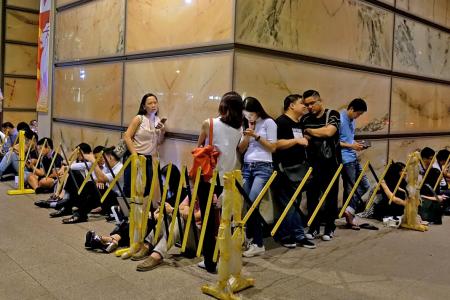Judgment reserved in City Harvest case
Legislative history brought up at criminal reference hearing before Court of Appeal; five-judge panel to give final verdict at later date
A five-judge Court of Appeal yesterday reserved judgment on legal arguments raised by the prosecution that, if accepted, may mean longer jail terms for the six people, including City Harvest Church founder Kong Hee, convicted of misusing millions in church funds.
Deputy Attorney-General Hri Kumar Nair argued the six should be convicted of the more aggravated charge of criminal breach of trust (CBT) as agents under Section 409 of the Penal Code, rather than plain CBT under Section 406.
The issue hinges on the interpretation of Section 409, which provides for heavier punishment if a person misappropriates property entrusted to him "in the way of his business as a banker, a merchant, a factor, a broker, an attorney or an agent".
In April, the majority of a three-judge High Court panel cleared the six of CBT as agents and instead convicted them of plain CBT. As a result, their initial jail terms of between 21 months and eight years were reduced to between seven months and 3½ years.
The majority ruled that Section 409 applies only to a "professional agent" who offers his services as an agent or makes his living as an agent; and directors such as the CHC six cannot be considered "agents".
It broke away from a legal position that had prevailed here for the past 40 years. The prosecution then applied for a criminal reference to seek a definitive ruling from the Court of Appeal.
It also sought to reinstate the original convictions of Kong and the five others.
Yesterday, Mr Nair, who traced the legislative history of the provision back to 19th century English laws, said he agreed that Section 409 covers professional agents but "that is not the only category that fits the bill", he said.
The senior counsel argued that "business" should be interpreted broadly so that it also covers agents who are entrusted with property in the regular course of their duties.
He argued that the thread running through banker, merchant and so on is not whether they are professional or offering services, but that these are individuals with a higher degree of trust placed in them by the public and therefore deserving of higher punishment.
"If that is the thread, then a director will fall nicely and squarely under that definition," he said.
'INTUITIVELY UNSATISFACTORY'
Mr Nair said his interpretation promotes the legislative purpose of the provision, which is to punish more severely those holding positions of great trust and confidence. He noted that the High Court majority accepted that their ruling was "intuitively unsatisfactory", resulting in directors being punished less severely than employees.
The defence aligned with one another in supporting the High Court's ruling.
Senior Counsel Andre Maniamargued that in England, the punishment for directors who commit CBT is lighter than that for clerks and servants.
The defence argued that if there was a lacuna, or a gap, in the law, it was up to Parliament to make the amendments.
Senior Counsel Kenneth Tan said: "The prosecution is not just trying to force a square peg into a round hole, it is trying to force a square peg into a non-existent hole."
The panel, comprising Judges of Appeal Andrew Phang and Judith Prakash and Justices Belinda Ang, Quentin Loh and Chua Lee Ming, will give its verdict at a later date. The decision is final.
FOR MORE, READ THE STRAITS TIMES TODAY
Get The New Paper on your phone with the free TNP app. Download from the Apple App Store or Google Play Store now



